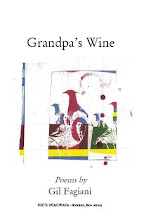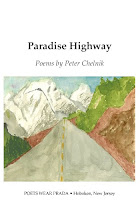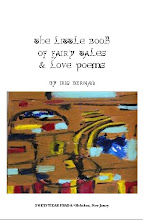The Beautiful Moment of Being Lost by Michael T. Young
 |
| The Beautiful Moment of Being Lost by Michael T. Young Poets Wear Prada Press, 2014 88 pages – PWP / Amazon |
Titles lure us to books. They serve as a grounding cord, to situate us in a particular location or overarching theme. They establish a mindset to navigate content. This is what happened to me while reading Michael T. Young’s collection: The Beautiful Moment of Being Lost.
In Young’s title, the abstract noun lost is concretized in poems that depict the poet as a wanderer in both familiar and foreign locations. The poem “A Method of Escape” exemplifies this:
Whenever we go for a walk you askYoung then encourages us to step off the cyclical path. He invites us to get lost during walks in a familiar place. For the poet, spontaneity reveals unexpected treasures. “Never let the usual expectations plot the course,” he writes.
where we are going and I think,
Eventually, where we started.
… let the time between be unplanned,In other poems lost represents a psychological state as in lost in thought, the meandering mind. Or lost in the sense of questioning who we are. Lost turns to loss when it captures the powerlessness one feels when confronted with illness and the death of a loved one, or events over which we have no control.
as uncharted as the charted urban streets we allow….
And there are other meanings, unusual interpretations for lost, such as becoming lost through language, through something as miniscule as a six-letter word. In the poem “The Word ‘Anyway’” the poet examines how “anyway” works as a detour, which sets him off course: “like a ramp off the highway leading me somewhere else,” which inevitably takes him “in another direction, though not, / necessarily, in a better one….”
The second abstract word in Young’s title is beautiful. For me, the word is representative of the poet’s consciousness. It is not the journey itself, but the way he sets off through uncharted terrain that is reflective of an enlightened mind. For the poet, lost paths are meaningful if we remain open to what they present. In this sense lost is what happens, but beauty is the approach. This is this writer’s path, when exploring themes of life and death, physical and mental landscapes.
Young is a lyric poet. He is adept at image making. The “oak’s bare branches lurch / into the winter air” while “puddles release their smallest / reflections.” Certain images act as a gong. They reverberate long after our eyes move on, to another page, as in these lines of “Random Note”:
… where I sit on the bench, shade slips over me like a hood,What I also admire about this collection is cadence. Many poems share a rhythm of ease that leads us from one moment to the next. It is obvious that Young is a careful crafter. Poems are mapped out using intentional line breaks — end-stopped or enjambed. And this creates a steady walk through words. Even the overall tone does not carry the voice of someone frantic and lost. Instead the poet winds his way through endless territory, skillfully as his use of enjambment. He speaks of this in “The Continuous Thread” when he writes: “One thing leads endlessly to another. / Even if this street is a dead end, / it will continue in a different fashion…”
and I’m whisked off, abducted by the day’s closing minions….
Young’s book holds to this premise: where one is led to, one is led to observe. In his signature poem “The Beautiful Moment of Being Lost,” he addresses this: “The secrets of a place are in its small streets, / its narrow passages…” (49). Traveling like this, even that which we tend to avoid can seem profound. As in the poem “Slug”:
Watching his deliberate movement, I forgotMoving purposely, willfully, the poet remains a lifelong voyager but without a definite map. What he encounters he accepts. In “As Is” the poet shares “even before I recognize these things / for what they are, /everything is / as it should be.”
he was a name we give each other in contempt.
What I noticed was his strange beauty and slow power,
and what in me refuses to be rushed….
In “Eyewitness,” while crossing the Hudson River on a ferryboat, he ponders:
… I would like to think, in spite of it,This is what Young aspires to. Faith is required to journey in ways that are foreign. Faith helps us move through the unfamiliar — that we might come out of it, changed. In his poem “Directions” the poet relies on this belief:
that my inner vision is sharper
as if age alone could teach me the apostle’s words
to ‘walk by faith, not by sight.’
Our heads tilt in a slow nod or shake;This is the message that Young leaves us with. The poet is first lured into the world “thrilled by the risk and uncertainty.” He then gathers strength, as he says, “from the pleasure / of wondering if I would make it home.”
our eyes cross figures in the air
writing a tenuous language that seems to say
there is no backward or forward,
no behind or ahead, only movement
from character to character, from stop to stop,
in books, on trains, in memory….
 Therése Halscheid’s latest book Frozen Latitudes (Press 53), won the Eric Hoffer Book Award, Honorable Mention for Poetry. Other collections include Uncommon Geography,Without Home and a Greatest Hits chapbook award. Poems and essays have appeared in The Gettysburg Review, Tampa Review, Sou’wester, Natural Bridge, among others. Recent awards include first in Welcome Table Press’s Creative Nonfiction contest. By way
of house-sitting she has been writing on the road for several years.
Her photography chronicles her journey, and has been in juried
shows. Poems in Frozen Latitudes recount her time in the Arctic north where she lived with and taught the Inupiaq of Alaska. See www.ThereseHalscheid.com.
Therése Halscheid’s latest book Frozen Latitudes (Press 53), won the Eric Hoffer Book Award, Honorable Mention for Poetry. Other collections include Uncommon Geography,Without Home and a Greatest Hits chapbook award. Poems and essays have appeared in The Gettysburg Review, Tampa Review, Sou’wester, Natural Bridge, among others. Recent awards include first in Welcome Table Press’s Creative Nonfiction contest. By way
of house-sitting she has been writing on the road for several years.
Her photography chronicles her journey, and has been in juried
shows. Poems in Frozen Latitudes recount her time in the Arctic north where she lived with and taught the Inupiaq of Alaska. See www.ThereseHalscheid.com.


































































